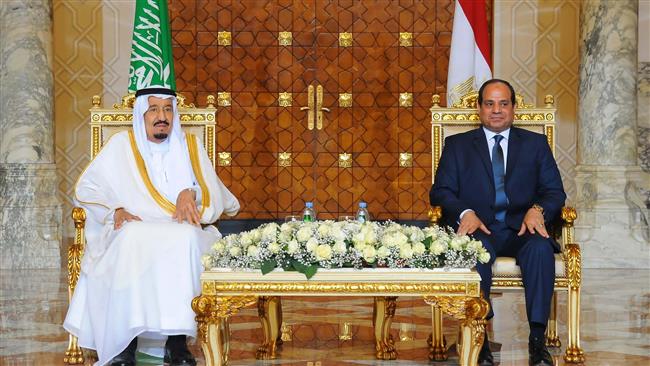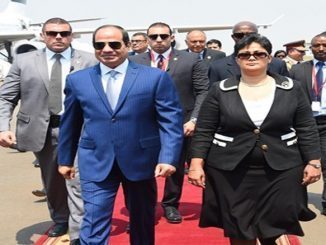
Once Egypt’s Administrative Court verdict nullified the controversial agreement between Egypt and Saudi Arabia over Tiran and Sanafir islands, the Egyptian government rushed to appeal against the historical verdict.
In fact, the Egyptian government has crossed the Egyptian public opinion when they were surprised by the agreement that was signed during the latest visit of King Salman to Egypt in April. The agreement, which transferred the two strategic Red Sea islands to Saudi Arabia-was faced by massive rejection from the public opinion in the country.
In response, thousands of Egyptians took to the streets in protest on April 15 (Land Day) and April 25 (Sinai Liberation Day) against the agreement, calling for the “Downfall of the Regime. “The demonstrations were the first huge movement against the al-Sisi regime that included different political affiliations and groups. The Egyptian security forces led arrest campaigns against activists and journalists who opposed the transfer of the islands to silence the Egyptian mob from rejecting the agreement.
Again, the Egyptian regime stands against the highest judicial court in Egypt to accept the agreement by appealing its verdict, but the question is: What makes al-Sisi regime insist on crossing the Egyptian will and face the judicial verdict?
Many observers point out that there are regional interests behind al-Sisi’s stance to transfer the islands to Saudi Arabia besides the economic grants that his regime received from the Kingdom to resolve the country’s economic problems.
The regional interest that pushes al-Sisi to insist on the deal is to pass the normalization process between Saudi Arabia and Israel. The plan is to ease the normalization process through Tiran and Sanafir islands which will act as the main gate to the process in the new regional order sponsored by the United States of America.
In this context, the political researcher Mohammed Seif Al-Dawla stated that the al-Sisi government rushed to file the appeal for many reasons, “First of all, al-Sisi wants to send implied messages to Saudi Arabia, Israel, U.S and other international and regional parties that he is still the only one who has full control over the country and that he is capable of passing all the deals and agreements.”
Since 1979, the Egyptian regime has gained its legitimacy by signing tens of economic, security and militarily agreements that have ruined the country’s independence and national will as Camp David, the military aid agreement, gas the deal with Israel and the Qualified Industrial Zone agreement.
He also added that al-Sisi wants to abort all the attempts that seek to free the judiciary and its rules from the executive hegemony. Seif al-Dawla said, “al-Sisi doesn’t want to create a judicial precedent that gives the chance for nullifying any agreement with countries, companies or foreign parties.”
Moreover, al-Sisi is afraid that the final verdict would end as a triumph for the national political opposition which would inspire them to challenge the ruling regime in other cases.
In the same context, the left activist Kamal Khalil has written on his Facebook account, “Abdel al-Fattah al-Sisi will give away Tiran and Sanafir islands to Saudi Arabia to sustain his rule in the country and for the interest of the Zionist entity.”
He added, ”the main aim behind ceding the islands is to internationalize the Gulf of al-Aqaba to extend the Camp David Accord by including Saudi Arabia in the area.”
“Once Camp David extends, all the oil countries will join it and there would be a new Arab initiative with Israel,” he said.
This clearly justifies the different Israeli analysts who praised the agreement and considered that it serves Tel Aviv interests.
The political researcher Herb Keinon of Jerusalem Post newspaper said that the agreement was signed after Israel and U.S. approval, especially that it put Tel Aviv with Saudi Arabia in one camp in facing many parties which cause a threat to Israel.
Keinon cited in his article that Israeli officials said, “It was obvious for everyone that the agreement came after calm negotiations between the four parties (Egypt, Saudi Arabia, Israel and U.S). He added that if both countries (Saudi Arabia and Israel) succeeded in reaching an agreement regarding this issue, this would pave the road for reaching more agreements in the future.”
For months, the Israeli Prime Minister Benjamin Netanyahu was talking about an unprecedented meeting that will benefit Israel interests and several Sunni countries in the region; pointing to secret talks between Israel and some countries that don’t have diplomatic relations with Israel as Saudi Arabia.
Moreover, after the Administrative Court verdict that nullifies the agreement, the Israeli political researcher Tsevi Beril at Haaretz newspaper advised al-Sisi to cross the Administrative court verdict to preserve his relation with Saudi Arabia that granted Egypt with huge financial aids to overcome its severe economic crisis.
He also added that al-Sisi and Netanyahu are similar in their domestic policy especially in dealing with the media as they control the journalism and limit the freedom of speech.Accordingly, al-Sisi shouldn’t take into consideration the verdict as Netanyahu does with the Supreme Court in Israel.
Looking closer to the scene with al-Sisi’s insistence on the agreement and the Israeli unprecedented flexibility in giving away the two strategic islands where its rights are protected by Camp David Accord; open the way for an important speculation that there should be a better deal waiting for Israel.
A new regional order seems to be prepared secretly that works on extending the relations between the Sunni Arab countries and Israel that would pave the road to broader normalization with Israel under the Saudi umbrella.
Recently, there were talks about reviving al-Hejaz Railway System between Saudi Arabia, Jordan and Turkey that was found during the Ottoman Empire era.
In parallel, the Israeli media has mentioned in 2012 that Israel wants to revive al-Hejaz Railway System that connects Haifa and Besan cities in the first phase and connects with the city of Ebrd in Jordan in the second phase.
In addition, another project was presented in Israel on constructing Eilat Railway Project that would link between Europe and Asia through a railway from Haifa and Ashdod which will link the Mediterranean with the Red Sea.
The Israeli political expert in the Arab Affairs Yuwaf Shtrn said that away from the economic benefits, Tel Aviv will be able through Eilat Railway System to put the cornerstone for a strategic economic cooperation with the Arab world in case of resolving the Palestinian conflict.
The timing of the talks on constructing railway projects in Saudi Arabia and in Israel infer that there is a kind of coordination and agreement between both sides that the coming time would have broader economic ties joining both countries.
Moreover, the Herald Tribune newspaper has reported in April 2016 that military maneuvers will take place between Saudi Arabia and Israel from Tiran Island in the Red Sea.
The Tribune published that secret documents were leaked by the senior military official linked to left-wing liberal party “Meretz” said that in 2014 memorandum of understanding was concluded on joint military cooperation between Israel and Saudi Arabia in the Red Sea.
“Playing a game of mutual interest, the oil-rich country and Israel held a joint operation staff in Tiran Island. The island will be used as the Headquarter of a joint cooperation between Tel Aviv and Riyadh in the Red Sea,” said the Tribune.
Finally, It seems that the region is about to face a new order in terms of normalization and military cooperation with Israel under al-Sisi and King Salman’s mediation.



